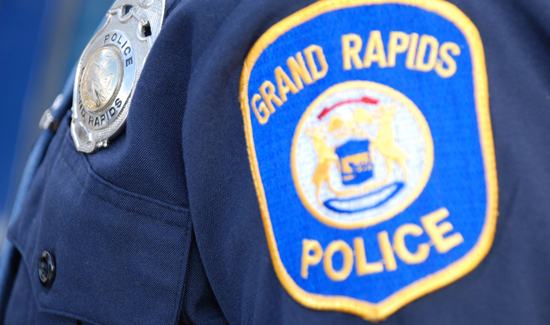Police Unions Call for “Rational Voice”

Photo: Grand Rapids Police Department Facebook page
Via MLive.com:
GRAND RAPIDS, MI — A pair of Grand Rapids police unions are asking city leaders and the public to have a “rational voice” and “complete” viewpoint while evaluating local policing efforts.
The Grand Rapids Police Officers Association and Grand Rapids Police Command Officers Association released a joint statement Monday, May 22, in response to a consulting firm’s critique of the city’s recent traffic stop study.
The critique, put together by Dolan Consulting Group’s Dr. Richard Johnson, detailed concerns regarding the methodology of the study, which found black drivers in 2015 were twice as likely to be stopped by police than non-black drivers.
“The rationale for the GRPOA and GRPCOA release is not as a retort or denial to the original report but as a reminder to the city management, the commission and the public that in as politically charged an atmosphere as we are experiencing right now, we as a community can’t afford to take an incomplete viewpoint on important issues like this,” the statement reads.
“We are encouraging everyone to slow it down, take time to review the material by Dr. Johnson and weigh it in an attempt to bring a fuller understanding of what the facts are.”
Dolan Consulting CEO Harry Dolan, a former Grand Rapids police chief, asked Johnson to asses the traffic stop reports ahead of his trip to West Michigan, according to the unions’ statement. Johnson was scheduled to teach a training course last week at Calvin College.
During the session, Johnson provided copies of his 14-page critique, which was later shared throughout the police department.
Union leaders said there’s a growing sense of anger and frustration among the police ranks due to a lack of support from political leaders. Such support is needed, the statement reads, to sustain a sense of camaraderie and “build an orderly society.”
Further, union leaders said attempts to engage in public discussion have not been as successful as envisioned.
“Our association leaders have decided not to engage in public discussions that may become filled with emotional outcries,” the statement reads. “We feel that would be unproductive and potentially cause more division. Our hope is for more relaxed and personal settings to share our stories and concerns.”
That hope includes developing better relationships within the community, and a better understanding of police work and challenges facing officers today, according to the unions’ statement.














